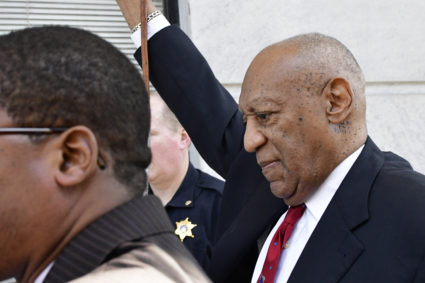
Often overlooked in America’s history of World War II are the 27 Tuskegee Airmen who disappeared in combat. Geoff Bennett…

PHILADELPHIA (AP) — The U.S. Supreme Court announced Monday without comment that it would not review Bill Cosby's sexual assault case, leaving him a free man and ending a two-decade legal drama that shifted the cultural landscape, destroyed the groundbreaking Black actor's reputation, and sent him to prison for several years in his late 70s.
The high court — whose nine members include two men accused of sexual misconduct themselves — declined to review a stunning decision out of Pennsylvania that released Cosby from prison in June over the word of a former prosecutor who said he had made a secret promise with Cosby's lawyers that he could never be charged.
A Cosby spokesperson expressed "sincere gratitude to the justices" for the ruling on behalf of Cosby and his family and said he was the victim of "a reprehensible bait and switch" by the prosecutor and trial judge in the case.
"This is truly a victory for Mr. Cosby, but it shows that cheating will never get you far in life, and the corruption that lies within Montgomery County District's Attorney Office has been brought to the center stage of the world," spokesperson Andrew Wyatt said.
The office of Montgomery County District Attorney Kevin Steele, in Philadelphia's suburbs, did not have an immediate comment. Accuser Andrea Constand planned to issue a statement later in the day.
Steele has said there's no evidence that Cosby had a legally binding agreement that he could never be prosecuted.
His predecessor, Bruce L. Castor Jr., never put it in writing or told anyone in his office about it. He never mentioned it in public until new evidence emerged and the case was reopened a decade later.
"A secret agreement that permits a wealthy defendant to buy his way out of a criminal case isn't right," Steele argued in court in 2016 as he pressed to send the case to trial.
Montgomery County Judge Steven O'Neill found Castor's testimony on the point not credible and sent the case to trial. However, the state Supreme Court later ruled that whether or not the supposed agreement was legally binding, Cosby relied on it when he gave eye-popping — and potentially incriminating — testimony in a lawsuit later filed by Constand.
"The principle of fundamental fairness that undergirds due process of law in our criminal justice system demands that the promise be enforced," Justice David N. Wecht wrote last year.
During the deposition, a seemingly free-wheeling Cosby gave long, stream-of-consciousness answers to questions from Constand's lawyers. He detailed his sexual involvement with a string of young women, a few still in their teens, over the years. And he recalled giving several of them, including Constand, alcohol or pills while he remained sober.
"I don't hear her say anything. And I don't feel her say anything. And so I continue and I go into the area that is somewhere between permission and rejection. I am not stopped," Cosby said in the 2006 deposition, describing a sexual encounter that came after he gave her three pills for stress, which she said knocked her out.
He was arrested in the Constand case on Dec. 30, 2015, just days before the 12-year statute of limitations was set to run out. Steele had reopened the case after The Associated Press went to federal court to unseal Cosby's long-buried testimony in Constand's lawsuit.
Cosby, after giving four days of testimony, paid her $3.4 million to settle the case.
He went on trial in the criminal case in suburban Philadelphia in June 2017. The jury could not reach a verdict. Less than a year later — after media reports about media mogul Harvey Weinstein's sexual abuse of women galvanized the (hash)MeToo movement — a second jury convicted Cosby of drugging and molesting Constand.
The AP does not typically identify people who say they are victims of sexual assault unless they grant permission. Constand has done so.
Sustain our coverage of culture, arts and literature.